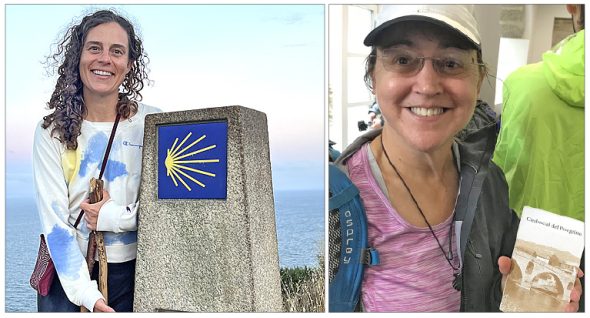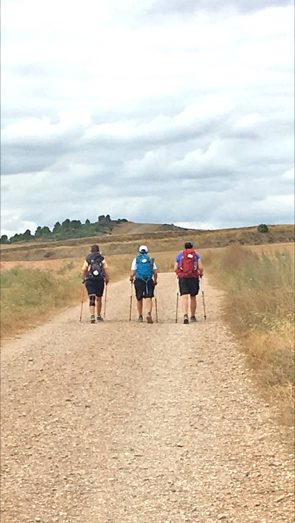
Longtime villagers and intrepid globetrotters Emily Foubert (left) and Diana Glawe (right) will give a joint presentation on their separate experiences hiking the 500-mile-long Camino de Santiago. Whereas Foubert took her pilgrimage alone and carried her all her belongings with her, Glawe “slackpacked” the trail and traveled with two friends. The talk will be at Wright State University on Thursday, Feb. 9, at 7 p.m. Held in the student union’s Endeavor Room, the talk will be free and open to the public. (Submitted photos)
A tale of two pilgrims
- Published: February 6, 2023
Stretching from the Pyrenees mountain range in western France to where Spain’s rugged coastline splits the Bay of Biscay from the Atlantic is Europe’s longest and most storied pilgrimage route: the famed Camino de Santiago.
This is the “Way of Saint James.”
El Camino leads hikers through rolling hills and vineyards, up formidable peaks and across jagged passes, over vast plains under a punishing sun, into the city and back to the countryside — 500 miles of dirt and stone paths winding all the way to the end of a continent.
Ultimately, though, it is a path that leads inward.
As the late Pope Benedict XVI once described El Camino, it is a “way sown with so many demonstrations of fervor, repentance, hospitality, art and culture, which speak to us eloquently of the spiritual roots of the Old Continent.” For millennia, travelers of every nationality under the sun have flocked to walk El Camino in search of something beyond a typical hike. While some may seek salvation or solace, others might aim to prove something, to test themselves, to see where their limits lie.
For longtime Yellow Springs residents Diana Glawe and Emily Foubert, El Camino de Santiago offered lessons in love, loss and letting go.
Although the pair traversed El Camino separately in recent years, Glawe and Foubert will share their experiences at a joint public speaking event at Wright State University on Thursday, Feb. 9, at 7 p.m.
As part of the university’s “Adventure Speaker Series,” presented in partnership with Montgomery County’s Five Rivers MetroParks, Glawe and Foubert will regale attendees with tales of their pilgrimages and offer planning information and practical tips for any aspiring pilgrims. The talk will be free and open to the public.
Between the two, Glawe was the first to embark on the 500-mile adventure.
Even before El Camino, she had been an avid outdoorswoman. Biking, climbing, hiking, kayaking — Glawe did it all. Her adventures took her across the U.S. time and again, the misty slopes of Appalachia and, earlier in life, to more far-flung expeditions in over a dozen countries.
It wasn’t until her wife’s funeral in 2017 when Glawe first considered El Camino. Deb Marvin, Glawe’s partner in life and on the trails, made the trip back in 2014 with her longtime friend, Rita.
“At Deb’s funeral, [Rita and I] were talking about how meaningful doing the Camino was to Deb,” Glawe told the News. “I said, ‘Wow, I wished I would have done that,’ and Rita said, ‘Well … let’s go.’”
So, in 2018, Glawe, Rita and Deb’s college roommate, Connie, embarked on the journey. Upon landing in Saint-Jean-Pied-de-Port, France, in mid-September, the three of them formed what they called “Team Deb.”

“Team Deb” hiking the 500-mile-long Camino de Santiago. (Submitted photo)
As Glawe said, the group wound up being among innumerable other pilgrims hiking El Camino in memory of a recently deceased loved one. The wide-open skies, the meditative act of endlessly placing one foot in front of the other, of reducing life to the simplest goals — that is, getting from a “here” to a “there” — all cleaved a space for Glawe to grieve her wife’s death.
“I felt her all around me,” she said. “I never really cared for walking; it was Deb who loved to walk. But one day, I distinctly remember — I might have just passed by a forest, but there really wasn’t anything special about the terrain — when it just struck me. I looked up, saw the bluest sky, and suddenly felt overwhelming joy. I thought, ‘This is how Deb must have felt all along.’”
Galvanized by this joy, Glawe and the rest of Team Deb traversed a total of 485 miles across the northern tip of Spain. They averaged 15 miles daily over the span of 39 days.
“In that length of time, living the simple life — focused on getting to the next place — allowed me to just look at life, take inventory and do a lot of reflecting,” Glawe said. “I found it incredibly healing.”
She said that along the way she forged fleeting, yet profoundly intimate, relationships with other pilgrims walking with similar mindsets.
“Many people walking are also going through some major transitions, so the discussions are immediately deep,” Glawe said. “Everyone’s in that same headspace. No one is talking about the weather. Everyone is sharing their stories, and I think there’s a real community in that.”
At about the halfway point, the trio came across one of the most significant landmarks of the pilgrimage: the Cruz de Ferro, or the Iron Cross. Nestled between the dusty towns of Foncebadón and Manjarín is a 16-foot cross under which pilgrims can place a stone they might have carried with them.
“It’s symbolic of leaving a burden behind,” Glawe said. “I said a prayer for Deb, and I left a little glass piece with a copper frog in it. Deb really liked frogs.”
By and large, Team Deb experienced great fortune on the trail. Even in the mercurial months of September and October, they hardly suffered any rain. In the cities and towns, the women were able to get by comfortably on what little Spanish they knew.
“‘Donde esta el baño,’ ‘gracias,’ ‘vino de casa’ — you know, the essentials,” Glawe said with a laugh.
Glawe described the group’s style of hiking El Camino as “slackpacking.” By paying a little extra, the group’s luggage went wherever they did. A tourism service would outpace the group and drive the belongings the group didn’t want to hike with to the next prearranged lodging along the path. Instead of carrying 30 pounds of luggage each day, Glawe was only saddled with her 10-pound day pack.
“Slackpacking definitely made the walk more pleasant,” she said.
Glawe said she hopes to outline the pros and cons of slackpacking and prearranged lodging versus more minimalist hiking during her and Foubert’s presentation next Thursday. Glawe hopes to offer any would-be pilgrims tips on mental and physical preparations, what items should be carried and — perhaps most importantly — how to take care of your feet along the 500-mile journey.
Conversely, Foubert will share her experiences of traversing El Camino with nothing more than her 10-pound backpack and a can-do attitude.
Also unlike Glawe, Foubert went alone. The village native and current lead naturalist at Glen Helen embarked on her journey across France and Spain in June of last year. Her pilgrimage took her 45 days to complete, and all said and done, she hiked for a total of 540 miles.
As Foubert explained, her journey — much like Glawe’s — was equal parts introspective and physical.
“In a sense, nature is my spirituality,” Foubert said. “That’s where I find my higher power, my loving power, God — whatever you want to call it. The Camino was a way to connect to both that and to my body, all from the physical act of walking.”
Although the interminable horizons and winding paths offered Foubert the personal spiritual communion she always experienced in nature, her mind was often elsewhere. Foubert was among the countless pilgrims along the path grieving the loss of a loved one: her mother, Diane, who died in May 2020.
“It had been two years since my mother passed away when I decided to do the Camino,” Foubert said. “She was my person, my best friend. People told me I’d always feel her loss, but I figured I’d eventually get to a place where I’d feel whole again. A part of walking the Camino was in pursuit of that ‘wholeness.’ I walked the entire way talking with mom, walking with her.”
Foubert added: “I thought the trip would make me whole again, but really, it didn’t. Not that it wasn’t therapeutic and self-actualizing for me, but now that I’m done, mom is still gone. Maybe the Camino might have given me some acceptance of that.”
Like Glawe, Foubert said she found immense solace in talking with the other pilgrims — hearing their stories and sharing her own.
But interestingly, these strangers gave Foubert new reasons to grieve.
“It was a continual lesson of letting go — whether it was someone with whom you connected really deeply along the way, or a loved one at home,” she said. “There was this intense intimacy of getting to know someone and then leaving. That was on repeat the entire time.”
Foubert reflected fondly on a Dutch woman hiking El Camino alone who was processing a divorce. She described the woman seeking to become “the captain of her own ship” by figuring out who she was without her husband in her life.
The two hikers shared many tears over many miles.
She also recalled a family from San Diego — ex-Mormons who left the church when asked to condemn gay marriage — whom she met among a cropping of monastic ruins in “the middle of nowhere, Spain,” as Foubert described it. She bonded deeply with the family, even teaching the daughter tai chi, but it wasn’t long before it came time to say “goodbye.”
“Always connecting, then leaving; always arriving, then departing,” Foubert said. “You’re always surrounded by metaphors in nature, but the Camino made it more apparent.”
While Foubert’s spiritual pilgrimage shared much in common with Team Deb’s, Foubert’s natural proclivity for wandering made for a novel experience. Unlike Glawe and company, Foubert began her trek in Lourde, France — over 150 kilometers northeast of Saint-Jean-Pied-de-Port. This starting point significantly extended Foubert’s jaunt through the Pyrenees mountains.
“It wasn’t bushwacking, exactly, but there were hardly any trails there,” she said. “I just trusted that I’d figure it out. And I did.”
Along El Camino, Foubert went from hostel to hostel — and although Glawe said she had been daunted by the ruggedness of that approach, Foubert said she found nothing but hospitality at each of her stays.
“There’s this saying on the trail: ‘The Camino will provide,’ Foubert said. “There’s this trust in the kindness from others that you’ll receive. There’s this looking after one another that’s rare in the world. The collective ‘we’ on the path is vastly different than the individualist mentality of today.”
She continued: “The Camino can teach us not only individual ways of being, but also how to be together as humans. I think that’s what I want to communicate in my talk.”
Foubert’s and Glawe’s talk, titled “El Camino de Santiago: Two Styles of Travel,” will be presented as part of Five Rivers MetroParks’ and Wright State University’s “Adventure Speaker Series” on Thursday, Feb. 9, 7–8:30 p.m. Their talk will be held in the Endeavor Room in the university’s student union building. Their talk, and others in the series, will be free and open to the public.
One Response to “A tale of two pilgrims”
The Yellow Springs News encourages respectful discussion of this article.
You must login to post a comment.
Don't have a login? Register for a free YSNews.com account.











My sister has done that walk several times and says it’s amazing. Plus she really stays in shape. She lives there in The Springs. Hope she sees this article. Those women have a great tale to tell. Hope they get to go back and do it again. Cheers ladies!